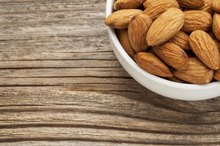How Can I Lower My Cholesterol Before a Blood Test?
Cholesterol is not your body's enemy but rather an asset, aiding in cell formation and hormone production. Your liver produces the exact amount your body requires; any excess amounts come from the foods you eat and lack of physical activity, as FamilyDoctor.org explains. The site continues, adding that these excess amounts pose a health risk, increasing your chances of suffering from a heart attack or stroke. Blood tests are the only way to detect high cholesterol levels. If you feel you suffer from high cholesterol, and want to lower it before testing, you can begin with small lifestyle changes that might make a difference.
Reduce your cholesterol intake 1. Consume no more than 300 milligrams of cholesterol each day. Read food labels for cholesterol content, paying close attention to the serving size. A particular item might only contain 25 milligrams of cholesterol, but the serving size might be a half cup.
Do Nuts Have Cholesterol?
Learn More
Swap saturated fats for healthy fats. Saturated fats increase your cholesterol levels, while unsaturated fats lower them. The main source of saturated fat is animal products such as whole-fat dairy, eggs, organ meat and red meat. Unsaturated fats are in oils such as canola, olive, sunflower and peanut. Avocados are another source, along with a variety of nuts. Only 7 percent of your daily calories should come from saturated fats.
Begin exercising for 30 minutes a day. Aerobic exercise helps lower your "bad" cholesterol and increase your "good" cholesterol, according to the Cleveland Clinic 2. Dedicate 30 minutes a day, five days a week to see results. Pick an activity you enjoy such as walking, playing basketball or mowing your lawn. Choosing your own activity ensures your success and dedication.
What Are the Sources of LDL & HDL Cholesterol?
Learn More
Eat more soluble fiber. Soluble fiber absorbs cholesterol in the bloodstream, preventing it from building up in your artery walls. Sources include oatmeal, apples, blueberries, raspberries and flaxseed. The Cleveland Clinic points out that for every 1 to 2 grams of soluble fiber you consume daily, you can lower your bad cholesterol by 1 percent 2.
Consume foods fortified with plant sterols and stanols. Sterols and stanols are natural substances that have cholesterol-lowering abilities. Consuming foods containing these substances daily may lower your cholesterol by more than 10 percent. For maximum benefits, eat a minimum of 2 grams each day--this equals two 8 ounces glasses of orange juice. Fortified foods include margarine, orange juice and yogurt.
Tips
Many variables factor into the length of time it takes to lower your cholesterol levels. Your diligence and dedication being the two most important. Exercise can produce results as quickly as two months for those leading a sedentary lifestyle. For this reason, plan a cholesterol-lowering routine a minimum of two months in advance to achieve the results you want to achieve.
Related Articles
References
- Family Doctor: Cholesterol: What Your Level Means
- Cleveland Clinic: Cholesterol-Lowering Strategies
- Ueda P, Gulayin P, Danaei G. Long-term moderately elevated LDL-cholesterol and blood pressure and risk of coronary heart disease. PLoS ONE. 2018;13(7):e0200017. doi:10.1371/journal.pone.0200017
- MedlinePlus. Niacin and niacinamide (vitamin B3). Updated March 20, 2019.
- Ruparelia N, Digby JE, Choudhury RP. Effects of niacin on atherosclerosis and vascular function. Curr Opin Cardiol. 2011;26(1):66-70. doi:10.1097/HCO.0b013e3283410c16
- Surampudi P, Enkhmaa B, Anuurad E, Berglund L. Lipid lowering with soluble Dietary fiber. Curr Atheroscler Rep. 2016;18(12):75. doi:10.1007/s11883-016-0624-z
- Párraga I, López-torres J, Andrés F, et al. Effect of plant sterols on the lipid profile of patients with hypercholesterolaemia. Randomised, experimental study. BMC Complement Altern Med. 2011;11:73. doi:10.1186/1472-6882-11-73
- Pittler MH, Thompson CO, Ernst E. Artichoke leaf extract for treating hypercholesterolaemia. Cochrane Database Syst Rev. 2002;(3):CD003335. doi:10.1002/14651858.CD003335
- Boost Your Cholesterol-Lowering Potential with Phytosterols. Cleveland Clinic.
- Cholesterol-lowering Supplements May Be Helpful. Mayo Clinic.
- Natural Medicine in the Clinical Management of Hyperlipidemia. Natural Medicines Database.
Writer Bio
Based in Jamestown, Pa., Hannah Rice Myers has more than 10 years of experience as a freelance writer, specializing in the health industry. Many of her articles have appeared in newspapers, as well as "Curing Epilepsy: Hope Through Research." Rice Myers received her master's degree in nursing from Upstate Medical University in 2001.









